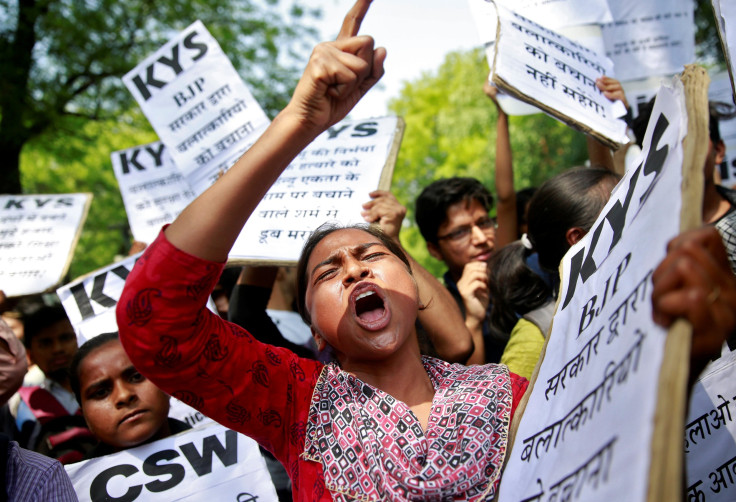Two Rape Incidents, Both Of Minors, Causing Outrage In India

In 2012, brutal rape of a medical student in a bus in New Delhi shocked India and drew international attention toward the issue of women safety in the country. Apart from the widespread outrage, it also led to the formation of strict anti-rape laws. However, six years later, sexual attacks against women and children continue across the nation.
India witnessed massive outrage in the past week over two gang rape cases, both of minors. In the first case, eight-year-old Asifa, from Kathua district in the northern state of Jammu and Kashmir, was brutally gang-raped by six men inside a local temple. According to a police charge sheet filed Monday, the men kept the girl in their custody for a week and after raping her several times, strangled and hit her with a stone “just to be sure that she was dead.”
The girl’s body was found in a forest near her village Jan. 17 and a medical examination confirmed she was sexually assaulted. Asifa went missing Jan. 10 after she left her home for grazing horses in the forest.
Reports stated the rape and murder of the girl, who belonged to the Bakherwal Muslim community, was planned in order to remove the minority nomadic community from the area.
During initial investigations, police arrested a minor, after which the case was transferred to Jammu and Kashmir police's crime branch. So far 8 persons have been arrested in connection to the case, which also includes two Special Police Officers.
In the other incident that happened in Unnao in the northern state of Uttar Pradesh, a 17-year-old was allegedly raped by a lawmaker and his brothers in 2017. The lawmaker, Kuldeep Singh Sengar, 50, from the ruling Bharatiya Janata Party denied the allegation.
The incident came to light after the girl tried to kill herself last week in front of the house of the state’s chief minister, alleging police inaction in spite of her registering a complaint. The girl alleged she was confined to a hotel room by the district administration, leaving her "without a phone or water and guards at every corner" in 2017.
The girl's father was arrested following the incident, and he died Monday in police custody. The autopsy report showed he had 18 assault injuries on his body and his intestines were ruptured, daily newspaper Times of India reported.
Though the Uttar Pradesh government initially tried to defend the lawmaker, on Wednesday, it decided to lodge an FIR against Sengar. The authorities also decided to hand over the case to the Central Bureau of Investigations, the country’s nodal investigative agency.
The incidents have triggered a political storm and public outrage across the country. Apart from minor girls being the targets in both the cases, another thread that links these cases is that it took months for both the incidents to get public attention.
Journalist Barkha Dutt, in a piece in the Washington Post, dubbed the recent incidents as “moments of acute national shame” and said “they have exposed the ugliest underbelly of India.”
© Copyright IBTimes 2025. All rights reserved.





















